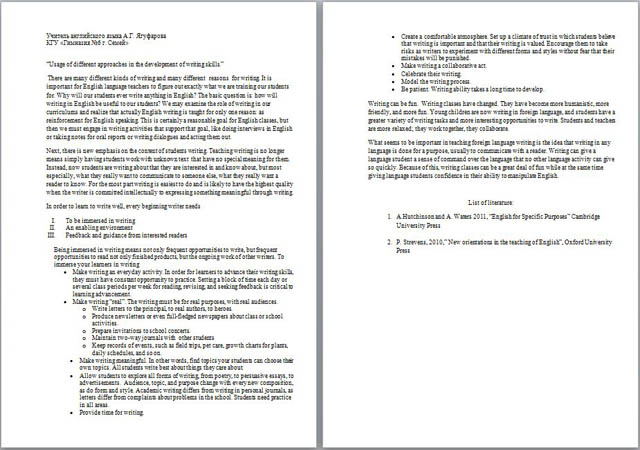Методическая статья посвященная обучению учащихся письму на иностранном языке. Существует много видов письма и различны причины письма. Учителям иностранного языка важно понимать насколько владение письменой речью будет полезно в будущем нашим учащимся.
Чтобы научить учащихся хорошо писать, учителю требуется продумать задание так, чтобы ученикам было интересно писать, а значит следует выбирать такие темы, о которых им хотелось бы говорить. Учитель должен помнить, что не только тема письма важна, но и собеседник, читатель, т. е. тот для кого этот материал пишется. В статье предлагаются некоторые советы в обучении и развитии навыка письма.
“Usage of different approaches in the development of writing skills.”
There are many different kinds of writing and many different reasons for writing. It is important for English language teachers to figure out exactly what we are training our students for. Why will our students ever write anything in English? The basic question is: how will writing in English be useful to our students?
We may examine the role of writing in our curriculums and realize that actually English writing is taught for only one reason: as reinforcement for English speaking. This is certainly a reasonable goal for English classes, but then we must engage in writing activities that support that goal, like doing interviews in English or taking notes for oral reports or writing dialogues and acting them out.
Next, there is new emphasis on the content of students writing. Teaching writing is no longer means simply having students work with unknown text that have no special meaning for them. Instead, now students are writing about that they are interested in and know about, but most especially, what they really want to communicate to someone else, what they really want a reader to know. For the most part writing is easiest to do and is likely to have the highest quality when the writer is committed intellectually to expressing something meaningful through writing.
In order to learn to write well, every beginning writer needs
I. To be immersed in writing
II. An enabling environment
III. Feedback and guidance from interested readers
Being immersed in writing means not only frequent opportunities to write, but frequent opportunities to read not only finished products, but the ongoing work of other writers. To immerse your learners in writing
Make writing an everyday activity. In order for learners to advance their writing skills, they must have constant opportunity to practice. Setting a block of time each day or several class periods per week for reading, revising, and seeking feedback is critical to learning advancement.
Make writing “real”. The writing must be for real purposes, with real audiences.
Write letters to the principal, to real authors, to heroes.
Produce newsletters or even full-fledged newspapers about class or school activities.
Prepare invitations to school concerts.

Maintain two-way journals with other students
Keep records of events, such as field trips, pet care, growth charts for plants, daily schedules, and so on.
Make writing meaningful. In other words, find topics your students can choose their own topics. All students write best about things they care about.
Allow students to explore all forms of writing, from poetry, to persuasive essays, to advertisements. Audience, topic, and purpose change with every new composition, as do form and style. Academic writing differs from writing in personal journals, as letters differ from complaints about problems in the school. Students need practice in all areas.
Provide time for writing.
Create a comfortable atmosphere. Set up a climate of trust in which students believe that writing is important and that their writing is valued. Encourage them to take risks as writers to experiment with different forms and styles without fear that their mistakes will be punished.
Make writing a collaborative act.
Celebrate their writing.
Model the writing process.
Be patient. Writing ability takes a long time to develop.
Writing can be fun. Writing classes have changed. They have become more humanistic, more friendly, and more fun. Young children are now writing in foreign language, and students have a greater variety of writing tasks and more interesting opportunities to write. Students and teachers are more relaxed; they work together, they collaborate.
What seems to be important in teaching foreign language writing is the idea that writing in any language is done for a purpose, usually to communicate with a reader. Writing can give a language student a sense of command over the language that no other language activity can give so quickly.
Because of this, writing classes can be a great deal of fun while at the same time giving language students confidence in their ability to manipulate English.

 Получите свидетельство
Получите свидетельство Вход
Вход












 Методическая статья для учителей английского языка "Usage of different approaches in the development of writing skills" (18.91 КB)
Методическая статья для учителей английского языка "Usage of different approaches in the development of writing skills" (18.91 КB)
 0
0 356
356 34
34 Нравится
0
Нравится
0







